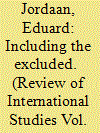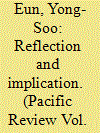| Srl | Item |
| 1 |
ID:
108506


|
|
|
|
|
| Publication |
2011.
|
| Summary/Abstract |
Cosmopolitanism is frequently criticised for overlooking the situatedness of morality and the importance of solidarity in their aspiration to global justice. A number of thinkers take these criticisms seriously and pursue 'a communitarian path to cosmopolitanism'. Four such approaches are considered. All four view morality and justice as grounded in a specific social setting and hold that justice is more likely to result if there is some 'we-feeling' among people, but are simultaneously committed to expanding the realm of justice and moral concern to beyond national boundaries. To enable the theorisation of an expanded realm of situated justice and moral concern, community is conceived as not necessarily corresponding to political boundaries and the moral the self is seen as able and eager to loosen some of its traditional moral connections and to form new ones. Unfortunately, these approaches are likely to exclude significant segments of the world's population from the expanded realm of moral concern they theorise, most notably, a large proportion of the world's poor. It is suggested that the thought of Emmanuel Levinas might offer a way of reducing the gap between solidarity and moral universalism.
|
|
|
|
|
|
|
|
|
|
|
|
|
|
|
|
| 2 |
ID:
186122


|
|
|
|
|
| Summary/Abstract |
This article elaborates on the following two questions and their implications. First, how can we as analysts offer compelling explanations for weak states’ agency and behaviours in the current global political and economic environments marked by multiplicity and fluidity? Second, what are the major causal factors that enable or influence weak actors’ agency, and under what conditions is their agency facilitated or constrained? Although an extensive literature in the discipline of International Relations (IR) confirms that today’s world is highly complex and diverse in terms of who or what matters in global politics, the subject of weak states and their agency is still not adequately discussed. Furthermore, the issues of methodology and theorising for the subject remain uncharted territory. By reflecting upon the main arguments and empirical findings of our special issue, this concluding article makes a case for ‘open-ended’ analytic eclecticism as an alternative methodological/analytical scheme, and lays preliminary ground for theorising weak states’ agency in the changed and changing global environments in the twenty-first century.
|
|
|
|
|
|
|
|
|
|
|
|
|
|
|
|